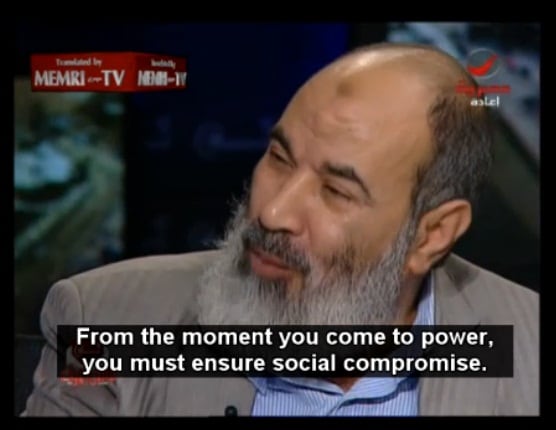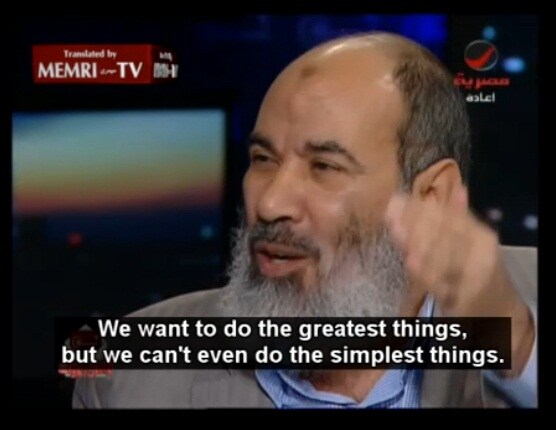Following are excerpts from an interview with Egyptian Islamist Nageh Ibrahim, one of the leaders of Al-Gama'a Al-Islamiyya, which aired on Rotana Egypt TV on January 25, 2012:
To view this clip on MEMRI TV, visit http://www.memri.org/legacy/clip/0/0/0/0/0/0/3312.
Nageh Ibrahim: "The way to treat Islamist ideology or any form of extremism is through pluralism. In Al-Azhar, there was pluralism in religious law and later in politics. Al-Azhar would send its most prominent graduates to Europe, where they would experience religious pluralism firsthand. Egypt also has religious pluralism, because we have Christians here, and we used to have Jews. It contained all types of pluralism. Pluralism shapes one's personality."
Interviewer: "It shapes one's personality and makes one accept the other."
Nageh Ibrahim: "It makes one tolerant of the other. […]
"Islam is infallible, but the Islamic movement is by no means infallible. In Islam, there is no room for falsehood, whereas the Islamic movement sometimes makes mistakes. One can never make arguments against Islam. This distinction is very important – for Islamists as well as for the secular. The Islamists must realize that they should not get angry if they are criticized. The criticism is not leveled against Islam, but against people who adhere to Islam."
Interviewer: "They are not open to criticism?"
Nageh Ibrahim: "That's right, and that is a problem. But on the other hand, secularists must avoid turning criticism against the Islamic movement into criticism of Islam. That is a leap… Take Nawal Sa'dawi, for example. She jumped from criticism of the Islamic movement to criticism of Islam itself. That is crossing the line. […]
"The assassination of President Sadat was a major mistake, not a minor one. Others and I have said that if we could go back in time, we would not have killed Al-Sadat. Sadat was killed for reasons that could have been avoided. Young people do not take the positive into consideration alongside the negative. Sadat had many great deeds to his credit, including the October [1973] victory, the release of the detainees, and the fact that he allowed Islamic preaching and gave it the 'kiss of life.' Islamic preaching was dead before the days of Sadat. These three good deeds compensate for all the tactical mistakes he made. […]
"The problem is that the young people are full of zeal, and always see the negative. I learned in prison that you should look at the positive before you see the negative." […]
SUPPORT OUR WORK

Interviewer: "Do you believe that the restoration of the Caliphate is realistic at present?"
Nageh Ibrahim: "No, my view is that the old image of the Islamic Caliphate has changed, and that it is impossible to unite the Arab and Islamic states under a single ruler. It is impossible to unite their intelligence agencies, their armies, their economic, and so on. It's not going to happen. It's impossible. If the poor countries accept it, the rich countries won't. If the countries with small armies accept it, the countries with large armies and intelligence agencies won't. The model that is conceivable today for the Islamic Caliphate…" […]
"…is the model of the European Union, with a united economy, a single currency, and with the possibility of traveling between countries…"
Interviewer: "So the modern Islamic Caliphate would be like the European Union – an economic union?"
Nageh Ibrahim: "No, there would be political cooperation between them. The European Union is concerned with politics, and it has NATO as well. But at the very least… When I wrote an article about this, some people criticized me, and I said to them: After you do it, you can criticize me. This is a problem we all suffer from. We want to do the greatest things, but we can't even do the simplest things. We Islamists have this problem. We demand the greatest things without even doing the minimal things. Gradual progress is a universal law, whether we like it or not." […]
Interviewer: "Can we expect these [Islamic] movements, which have entered Parliament and fulfill a political role, to abandon their extremism for the sake of the national interest, or not?"
Nageh Ibrahim: "They will be forced to abandon their extremism."
Interviewer: "They will be forced to abandon extremism?"
Nageh Ibrahim: "Society will force them to do so. Let me give you an example. Let us assume that some Islamist becomes a minister, and before that, he was a preacher. As a preacher, he would declare, from the podium, that Israel must be destroyed, the Camp David Accords abolished, and the [Israeli] ambassador kicked out. He would say this in every sermon and at every convention, and the people would applaud him and say: If he comes to power, he will destroy Israel. But when he becomes a minister, he can no longer say such things, because abolishing the Camp David Accords would be a declaration of war. […]
"In his capacity as an Islamic preacher, he would curse America day and night, and his followers would applaud him."
Interviewer: "In his capacity as a preacher, he could preach to his followers and incite them."
Nageh Ibrahim: "But if, as a ruler, he were to curse America or declare war on it, this would have very serious consequences, which he and the country might not be able to bear. […]
"The Taliban are good, religious people. The main mistake was to rule Afghanistan as a country with the mentality of an organization. They destroyed the Buddha statues, which turned India as a whole against the Muslims. The Hindus burned copies of the Koran and harassed the Muslims. Very bad things happened because of the destructions of some statues. When the Taliban enabled Al-Qaeda to do whatever it wanted, this led to the occupation of Afghanistan. They were ruling the country with the mentality of an organization. A country must be run in keeping with the principles of statesmanship, not of Islamic preaching, and not according to the mentality of an organization. […]
"There is a difference between the principles of statesmanship and those of preaching. When it comes to the latter, you can be alone and confront others, because they are based upon the religious doctrine of allegiance and disavowal. Statesmanship, on the other hand, is based upon domestic and social compromise." […]
Interviewer: "Is it possible that an internal Islamic conflict will develop in Egypt some day?"
Nageh Ibrahim: "Yes, it is possible. There is an internal Islamic conflict, but it was restricted to ideology. An ideological conflict is a simple matter – I say something in a lecture or in the mosque and someone answer me. But today, the struggle is over [parliamentary] seats. This is the worst kind of struggle, especially when religion is used. We must, therefore, remove religion from the struggle over seats." […]







